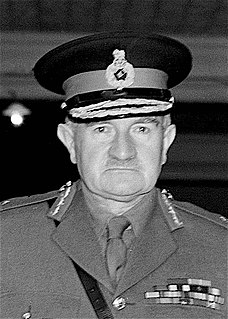A Quote by Samuel Smiles
The Romans rightly employed the same word (virtus) to designate courage, which is, in a physical sense, what the other is in a moral; the highest virtue of all being victory over ourselves.
Related Quotes
The word courage comes from the same stem as the French word Coeur, meaning "heart." Thus just as one's heart, by pumping blood to one's arms, legs, and brain enables all the other physical organs to function, so courage makes possible all the psychological virtues. Without courage other values wither away into mere facsimiles of virtue.
Virtue is the highest reward. Virtue truly goes before all things. Liberty, safety, life, property, parents, country, and children are protected and preserved. Virtue has all things in herself; he who has virtue has all things that are good attending him.
[Lat., Virtus praemium est optimum.
Virtus omnibus rebus anteit profecto.
Libertas, salus, vita, res, parentes,
Patria et prognati tutantur, servantur;
Virtus omnia in se habet; omnia assunt bona, quem penes est vertus.]
Without courage, you cannot practice any other virtue. You have to have courage - courage of different kinds: first, intellectual courage, to sort out different values and make up your mind about which is the one which is right for you to follow. You have to have moral courage to stick up to that - no matter what comes in your way, no matter what the obstacle and the opposition is.
Allah is in Himself the non-being and the being, the inexistent and the existent. He is at the same time that which we designate by absolute non-being and by absolute being; or by relative non-being and relative being. . . . All these designation come back to God alone, for there is nothing which we can perceive, know, write or say which is not Him.
Successful or not, acts of physical courage always bring honor. It is the smaller forms of valor - standing up for principle at the risk of social disapproval, economic loss or injury to career - that require the greatest moral will power. Since there is usually little upside to winning and a significant and often lasting downside to losing, moral courage often requires as much character as physical bravery.
To affirm life is to deepen, to make more inward, and to exalt the will-to-life. At the same time the man who has become a thinking being feels a compulsion to give every will-to-live the same reverence for life that he gives to his own. He experiences that other life as his own. He accepts as being good: to preserve life, to raise to its highest value life which is capable of development; and as being evil: to destroy life, to injure life, to repress life which is capable of development. This is the absolute, fundamental principle of the moral, and it is a necessity of thought.
It would appear... that moral phenomena, when observed on a great scale, are found to resemble physical phenomena; and we thus arrive, in inquiries of this kind, at the fundamental principle, that the greater the number of individuals observed, the more do individual peculiarities, whether physical or moral, become effaced, and leave in a prominent point of view the general facts, by virtue of which society exists and is preserved.
Our patriotism comes straight from the Romans. This is why French children are encouraged to seek inspiration for it in Corneille. It is a pagan virtue, if these two words are compatible. The word pagan, when applied to Rome, early possesses the significance charged with horror which the early Christian controversialists gave it. The Romans really were an atheistic and idolatrous people; not idolatrous with regard to images made of stone or bronze, but idolatrous with regard to themselves. It is this idolatry of self which they have bequeathed to us in the form of patriotism.



































